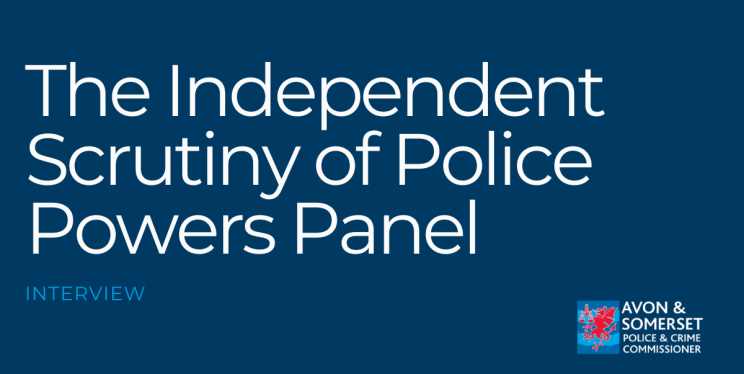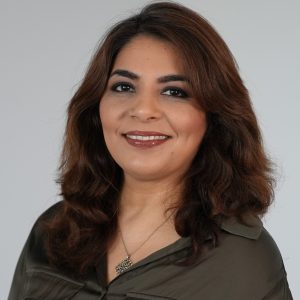ISoPP Interview: Professor Adeela ahmed Shafi MBE

The Independent Scrutiny of Police Powers (ISoPP) Panel is made up of local people from different backgrounds who want to help the Police and Crime Commissioner (PCC) monitor the use of force by the police, such as, the use of a taser, or the use of stop and search powers.
We’re interviewing our panel members to give insight into the panel – this time we speak to Co-Chair Adeela Shafi. Adeela is Professor of Education in Youth Justice at the University of Gloucestershire, a member of the Bristol Muslim Strategic Leadership Group (BMSLG), Board Member at Gloucestershire County Cricket and Co-Chair of the ISoPP Panel.

Professor Adeela ahmed Shafi MBE
What motivated you to join the Independent Scrutiny of Police Powers (ISoPP) Panel?
I wanted to understand how the police make decisions and how things worked behind the scenes. I felt the opportunity to scrutinise police powers in this way by lay people was an innovative approach to ensuring that police use their powers appropriately and proportionately. I believe this is a way to maintain public confidence as you can ask questions and challenge in a proper format and in a way the police will listen.
Can you describe your background and how it contributes to your role on the ISoPP?
I was born and raised in Bristol and so understand the city. Being from a minority ethnic and faith group (Muslim) I can bring that view to the table as everyone’s perspective of the police seem to vary, largely based on their experiences. This insight enables me to scrutinise police use of police powers from broader perspectives. Further, as an academic (Professor), I bring a critical and analytical approach with my own personal common-sense. All of these combined means I can scrutinise using different lenses, which I think is a strength.
What does a typical ISoPP session look like?
A typical ISoPP session begins with some information and feedback that Avon and Somerset Police (ASP) may want to share with us. Sometimes these are presentations on a new approach or tool being used. This is followed by the scrutiny of cases selected from the whole group of cases that have been scrutinised by panel members in the lead up to the panel meeting. These cases are discussed and points of concerned raised as well as good practice commended. The idea is to raise these directly with ASP for response there and then, or within their response to the ISoPP report which is written following the panel meeting.
What achievement during your time as a panel member are you most proud of?
I am pleased that we have played a part in making Body Worn Video (BWV) to be a business-as-usual approach. When the Panel began this was not the case. Increased BWV has meant there is more footage to scrutinise but this was balanced by Covid-19 which pushed scrutiny of cases to a remote approach. This has resulted in significantly more cases being scrutinised overall which is a good thing as it increases public confidence in that BWV is always there during a police interaction and that it can be viewed by us if the public require/request us to. This is a success for the Panel and for communities.
Watching bodycam footage of incidents of police using force can be distressing, how do you and the panel members take care of yourselves after viewings?
It can be distressing and in some ways it should be, because only if we feel the same distress that our communities feel can we effectively scrutinise police powers. Whilst there have been a number of cases over the years that have ‘stayed with me’ because of how they made me feel, I have used that to advocate for those who may have felt they have no voice in that situation.
If a case is particularly distressing, I have found it helpful to talk to other panel members and the ability to raise that case to be discussed and for something to be done about it is my way of looking after myself.
How does the ISoPP Panel collaborate with the police to improve accountability?
The ISoPP produce a report which summarises the main themes from the Panel and asks the police to comment on either specific cases or themes. Our aim is for them to respond to those and for us to track how the learning from the scrutiny is implemented and embedded. We enjoy a very good and collaborative relationship with the police but this is not to be mistaken for reduced rigour. We use our ability to collaborate with them to challenge them and sometimes those conversations can be difficult. But as a Panel we feel it is our duty to have them. The police are responsive, though sometimes the learning is slower than we might expect in terms of filtering down to front-line police officers.
What do you believe are the most significant benefits of having community volunteers involved in monitoring police powers?
This is vital because like any profession you see things in a particular way in order to do your job. However, because of the nature of policing, they may not always view things from the perspective of the public whom they serve. Therefore, having community volunteers enables them to have that view so that they can effectively serve the community, be trusted by them and keep them safe. Without community volunteers, it can (and does) develop into a ‘them vs us’ situation.
Did you have pre-conceived ideas about the police and how they operate before joining the panel, and has being part of the panel affected this?
I am not sure I had preconceived ideas, rather no ideas. Having become part of the Panel I have learned a lot about policing and the difficult job they have to do and the fine lines they have to tread. However, I have made a deliberate and conscious effort to not be too involved or informed because it is important to retain the layperson perspective. Otherwise the scrutiny is not done for the community as they would not have all that knowledge.
